第5章 英译汉的疑点(静态动态)
英语专业英译汉第五章翻译技巧

3.The new situation requires the formation of a new strategy.
新形势要求制定新战略。
4.Too much exposure to TV programs will do
great harm to the eyesight of children.
每天早上她都要到湖区去散步。
8) I am afraid I can't teach you swimming. I think my little brother is a better teacher than I.
恐怕我教不了你游泳,我弟弟教得比我好。
9) She had high praise for Dr. Higpan, although she complained about his strictness.
1.They will return in 60 days or two months. 他们60天后, 也就是2个月后回来。
2.Winter is the fourth and last season in a year. 冬季是一年中第四个也是最后一个季节。
3.The distance is four kilometers or 2.4856 miles. 距离是4公里,折合(即)2.4856里。
8) I am afraid I can't teach you swimming. I think my little brother is a better teacher than I.
9) She had high praise for Dr. Higpan, although she complained about his strictness.
翻译的难点和疑点2(handout)
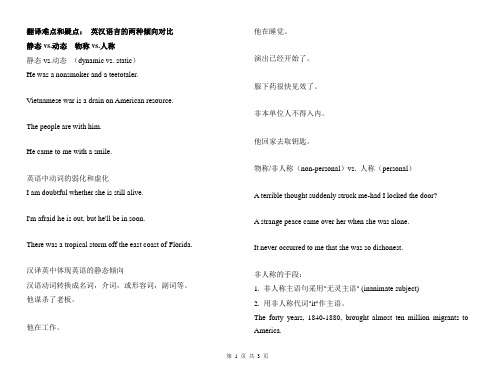
翻译难点和疑点:英汉语言的两种倾向对比静态vs.动态物称vs.人称静态vs.动态(dynamic vs. static)He was a nonsmoker and a teetotaler.Vietnamese war is a drain on American resource.The people are with him.He came to me with a smile.英语中动词的弱化和虚化I am doubtful whether she is still alive.I'm afraid he is out, but he'll be in soon.There was a tropical storm off the east coast of Florida.汉译英中体现英语的静态倾向汉语动词转换成名词,介词,或形容词,副词等。
他谋杀了老板。
他在工作。
他在睡觉。
演出已经开始了。
服下药很快见效了。
非本单位人不得入内。
他回家去取钥匙。
物称/非人称(non-personal)vs. 人称(personal)A terrible thought suddenly struck me-had I locked the door?A strange peace came over her when she was alone.It never occurred to me that she was so dishonest.非人称的手段:1. 非人称主语句采用"无灵主语" (inanimate subject)2. 用非人称代词"it"作主语。
The forty years, 1840-1880, brought almost ten million migrants to America.I am very sorry that the pressure of other occupations has prevented me from sending an earlier reply to your letter.The smallest excuse would have served.My conscience told me that I deserved no extraordinary politeness.The beautiful scenery gained the place quite a reputation.Paying his son's debts left him almost penniless.Her habit of biting her nails irritates me.Her refusal surprised us all.When he had to speak, his confidence suddenly deserted him.The old house had seen better days.Everything at the party spoke of careful planning.It is generally felt that his appointment was a grave mistake.The 5th century saw the end of the Roman Empire. The universe is not rich enough to buy the vote of an honest man.翻译难点和疑点长难句翻译Psychologically there are two dangers to be guarded against in old age. One of these is undue absorption in the past.(英语名词和介词用得多,汉语动词用得多。
翻译疑点问题
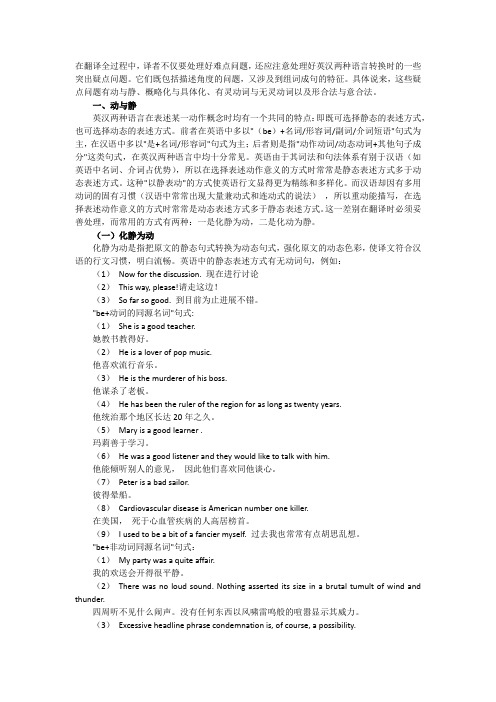
在翻译全过程中,译者不仅要处理好难点问题,还应注意处理好英汉两种语言转换时的一些突出疑点问题。
它们既包括描述角度的问题,又涉及到组词成句的特征。
具体说来,这些疑点问题有动与静、概略化与具体化、有灵动词与无灵动词以及形合法与意合法。
一、动与静英汉两种语言在表述某一动作概念时均有一个共同的特点:即既可选择静态的表述方式,也可选择动态的表述方式。
前者在英语中多以"(be)+名词/形容词/副词/介词短语"句式为主,在汉语中多以"是+名词/形容词"句式为主;后者则是指"动作动词/动态动词+其他句子成分"这类句式,在英汉两种语言中均十分常见。
英语由于其词法和句法体系有别于汉语(如英语中名词、介词占优势),所以在选择表述动作意义的方式时常常是静态表述方式多于动态表述方式。
这种"以静表动"的方式使英语行文显得更为精练和多样化。
而汉语却因有多用动词的固有习惯(汉语中常常出现大量兼动式和连动式的说法),所以重动能描写,在选择表述动作意义的方式时常常是动态表述方式多于静态表述方式。
这一差别在翻译时必须妥善处理,而常用的方式有两种:一是化静为动,二是化动为静。
(一)化静为动化静为动是指把原文的静态句式转换为动态句式,强化原文的动态色彩,使译文符合汉语的行文习惯,明白流畅。
英语中的静态表述方式有无动词句,例如:(1)Now for the discussion. 现在进行讨论(2)This way, please!请走这边!(3)So far so good. 到目前为止进展不错。
"be+动词的同源名词"句式:(1)She is a good teacher.她教书教得好。
(2)He is a lover of pop music.他喜欢流行音乐。
(3)He is the murderer of his boss.他谋杀了老板。
第五章 英译汉的疑点

John knew he was skating on the ice, but he could not resist teasing her sister about her boyfriend.
约翰知道这可不是闹着玩的,但他还是忍不住同姐姐开其男朋友的玩 笑。
entered a huge building. 他们沿着大街走去,经过许多商店,穿过一个大广场,然后进入了大厦。 4. The parades marched in the street ,carrying flowers and banners in their
hands. 游行的人拿着鲜花和彩旗在街道上行进。
He
has been
the ruler
of
the region
for as地l说on(g a出s )twent兽y y性ea的rs.
骚动; 暴动
他统治那个地区长达20年之久。
There was no loud sound. Nothing asserted its size in a brutal tumult of wind and thunder.
(1) Because of bad government, the company was in the red. 由于管理不善, 公司出现亏损。
(2) The factory is under construction. 工厂正在建造中。
11
G.无动词句
(1) Now for the discussion. 现在进行讨论
issues by only the lightest curtain. 我们对这些重要问题作出明智的决定仅一步之遥。
Chapter 5 英译汉的疑点(形合意合)

Hypotaxis vs. Parataxis
• • 汉语意合语言和英语形合语言 : 雨是最寻常的,一下就是三两天。可别恼,看,像 花针,像细雨,密密地斜织着,屋顶上全笼着一层 薄烟。(朱自清《春》) 试比较: 雨是最寻常的,(它)一下就是三两天。(不 过)(你)可别恼,(你)(试着向外边)看, (它正在下着),像花针,(也)像细雨,(它那 么)密密地斜织着,(以至于)(人家的)屋顶上 全笼着一层薄烟。
• •
试比较: (如果)一个民族不能自由地决定其政治地位, 不能自由地保证其经济,社会和文化的发展,要享 受其基本权利,/ 即使不是不可能,也是不容易的。 这一论断是无可置疑的了。
Hypotaxis vs. Parataxis
• More examples: • 1. All was cleared up some time later when news came from a distant place that an earthquake was felt the very day the little copper ball fell. • 过了一些时候,从远方传来了消息:在小铜球坠落的当天, 确实发生了地震。这一切终于得到了澄清。
Байду номын сангаасypotaxis vs. Parataxis
• To clarify the relations between words, phrases or clauses, English more often resorts to overt cohesion(显性接应),frequently using various cohesive ties such us relatives (relative or conjunctive pronouns and adverbs, eg. who, whom, whose, that, which, what, when, where, why, how), connectives (coordinate or subordinate conjunctions, eg. and, or, but, yet, so, however, as well as, (n)either … (n)or …, when, while, as, since, until, so … that, unless, lest), prepositions, and some others.
[静态,动态,汉英,其他论文文档]静态与动态:论汉英中性词的语义偏移
![[静态,动态,汉英,其他论文文档]静态与动态:论汉英中性词的语义偏移](https://img.taocdn.com/s3/m/cf28b829e009581b6ad9eb36.png)
静态与动态:论汉英中性词的语义偏移编者按:语言的结构(形式)是语言研究实现科学化的理想初始点,然而学术界不少人却受“超越结构主义”美好愿望的驱动而忽略它。
本期的组稿以“规则与变异”(马晓华、孙寰)为出发点,经过传承(王莉)环节凸显出语言的运作机制;情态的定量分析(宋丽珏)和模式化(郭淑芬)昭示我们,语言不是世界本身,而是人心智操作生成的相应图景(徐涛)。
提要:语义偏移是一种特殊的语义现象。
词语的意义有静态义和动态义之分。
静态义是存在于词典或人的大脑中的词的意义,动态义是完成交际功能所表现出来的意义。
语言中有些词的静态意义是中性的,但在动态时,虽然没有受到形容词修饰,一旦出现在某些特定的格式中,意义却向正极意义或负极意义转移。
这种现象被称为中性词语义偏移现象。
关键词:中性词语;语义偏移;格式Static and Dynamic Situation:Perspectives of Semantic Shift ofChinese-English Neutral TermsMa Xiao-hua(Northeast Forestry University, Harbin 150040, China)This article probes into special semantic phenomenon. The meanings of words ar e categorized as static and dynamic. Static meaning is the meaning of a word i n the dictionary or in the head.Dynamic meaning is what is expressed while in communication. In language some words appear neutral meaning when they are sta tic, but in dynamics thEir meanings will transfer to commendatory or derogator y ones when they arise in some special constructions though there are no adjec tive modifiers before them, which is known as semantic shifting phenomenon of neutral terms by some scholars.Key words:neutral terms; semantic shift; fixed construction1 引言词语的意义一般分为静态义和动态义。
华先发英汉翻译教程第五章

无生命主语句的译法
• E. 转化为无主句 • The heat makes me sweat like a pig. • F. 转化为外位成分 • G.采用使役句 • H. 拟人化
5.4 形合法和意合法
5.4 形合法和意合法
• Such was the force of the explosion that all the windows were broken.
5.1.1 化静为动
• A. 词类转换 • B. 被动 • C. 含有动作含义的静态表达 • D .其他
思考
• 为什么被动句在科技文用得很多?
5.1.2 化动为静
从翻译效果上看,有时把有些英语时态句式 译成汉语的静态句式往往比译成动态句式 效果要好。或者在英语动态句的意义不易 用对等的汉语动态句来表达的时候,或表 述不准确、不流畅时,也要转换为汉语的 静态句式。
5.4 形合法和意合法
• A. 简单句 (1) I was too tired to talk with you. 我很累,不能同你说话 。 (2) We never meet without a parting. 有聚就有散。 (3) He lived neither for fame nor for personal gains. 他活 着不为名不为利。 B. 并列句 (1) We have studied English for a year and we can act English. 我们学了一年英文, 已经能够演英文剧了。 (3) The door was opened, and the audience came crowding in. 门开了,观众一拥而入。 (4) And with this, and a proud bow to his patrons, the Manager retires, and the curtain rises.领班的说到这里, 向观众深深的鞠了一躬,退到后台,幕起。
英语翻译静态与动态PPT教学课件

2020/12/10
2
▪ 一、英语是屈折语,汉语是非屈折语,相对而言, 英语语言形态丰富。在一定程度上说,词的形态 (及形式)变化是否过于繁复多变决定了词类优 势。英语动词形态变化繁复而稳定,这就使英语 动词的使用受形态的制约,而名词就没有这个问 题,因此名词在英语中占优势,名词的优势导致 了介词的伴随优势。
▪
▪
第十一 讲
▪
静态与动态
▪
▪
(Static vs Dynamic)
2020/12/10
1
▪ I.教学目的和要求: ▪ 1.掌握动态化特征在汉语中的具体表现 ▪ 2.掌握静态化特征在英语中的具体表现 ▪ II.教学重点与难点: ▪ 1.汉语动词的翻译 ▪ 2.英语介词的翻译 ▪ III.教学方法:教师讲授、学生练习 ▪ IV.课时:2学时 ▪ V.课的类型:讲授课 ▪
▪ 因此,在有些情况下,汉语动词并不是译成英语动 词,而是要遵循英语的这一修辞特点,进行必要的 词性转换,即动词向名词、介词等的转化,使译文 符合英语的句法规律,因而更加地道、更显文采。
2020/12/10
8
▪ (一)动词转换成名词 ▪ 汉语中动词占优势,英语中名词占优势。一个主
要原因就是汉语中缺少像英语中的“-ing”词尾 和抽象名词的词缀那样的抽象化手段, ▪ 1.他妹妹老是说谎。
2020/12/10
7
▪ 下面从“动态”与“静态”这一修辞差异入手来 探讨汉译英中汉语动词(不包括判断动词和能愿 动词)的处理。
▪ 一、单动词汉语句子中动词的处理
▪ “英语的静态修辞的实质是名词优势和介词优势, 而介词优势又是名词优势的必然结果。因为名词 与名词之间要借助介词来联结”(蒋坚松, 2002: 56)。
英汉动态与静态的差异与词性转化
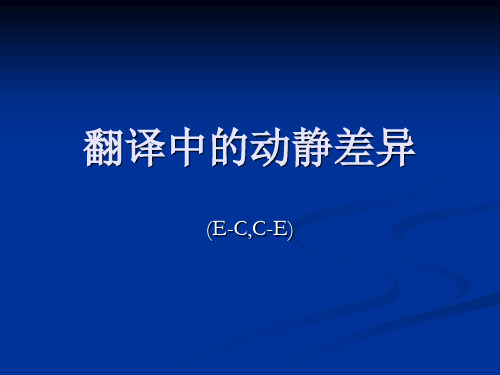
例 4: The Act allotted public land to each state for establishment of agricultural and industrial colleges.
该法案为各州划拨土地,用来建立工农业 学院。
二﹑英译汉时静态向动态的转换
二﹑英译汉时静态向动态的转换
例 9: An increase in the December 2006 passenger volume by 13.3 percent versus the same month last year meant that the total for the full year ( 19.2 million passengers) was 7.6 percent higher than in 2005. 2006年12月的旅客人数较前一年同期增加了 13.3%。 这说明全年的旅客总数(1920万人) 较2005年增加了7.6%。
二﹑英译汉时静态向动态的转换
例 10: Other investigators with a depth-psychological orientation emphasize the similarities between the fantastic events in myths and fairy tales and those in adult dreams and daydreams—the fulfillment of wishes, the winning out over all competitors, the desrtuction of enemies—and conclude that one attraction of this literature is expression of than which is normally prevented from coming to awareness.
-翻译疑点--动与静

---------------------------------------------------------------最新资料推荐-------------------------------------------------------翻译疑点--动与静-翻译疑点--动与静在翻译全过程中,译者不仅要处理好难点问题,还应注意处理好英汉两种语言转换时的一些突出疑点问题。
它们既包括描述角度的问题,又涉及到组词成句的特征。
具体说来,这些疑点问题有动与静、概略化与具体化、有灵动词与无灵动词以及形合法与意合法。
一、动与静英汉两种语言在表述某一动作概念时均有一个共同的特点:即既可选择静态的表述方式,也可选择动态的表述方式。
前者在英语中多以(be) +名词/形容词/副词/介词短语句式为主,在汉语中多以是+名词/形容词句式为主;后者则是指动作动词/动态动词+其他句子成分这类句式,在英汉两种语言中均十分常见。
英语由于其词法和句法体系有别于汉语(如英语中名词、介词占优势),所以在选择表述动作意义的方式时常常是静态表述方式多于动态表述方式。
这种以静表动的方式使英语行文显得更为精练和多样化。
而汉语却因有多用动词的固有习惯(汉语中常常出现大量兼动式和连动式的说法),所以重动能描写,在选择表述动作意义的方式时常常是动态表述方式多于静态表述方式。
这一差别在翻译时必须妥善处理,而常用的方式有两种:1 / 11一是化静为动,二是化动为静。
(一)化静为动化静为动是指把原文的静态句式转换为动态句式,强化原文的动态色彩,使译文符合汉语的行文习惯,明白流畅。
英语中的静态表述方式有无动词句,例如:(1) Now for the discussion. 现在进行讨论(2)This way, please!请走这边!(3) So far so good. 到目前为止进展不错。
be+动词的同源名词句式: (1) She is a good teacher. 她教书教得好。
翻译疑点
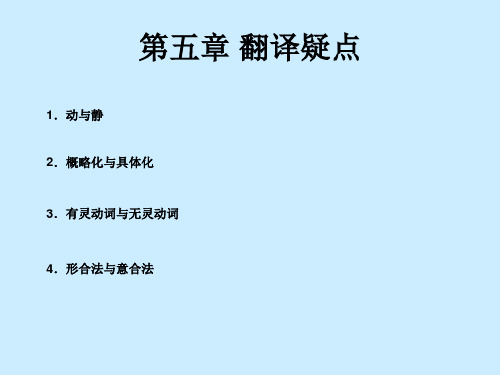
3.有灵动词与无灵动词 按照动作的执行者是有生命的还是无生命的这一标准,英语和汉语的动词均可分为有 灵动词和无灵动词。前者用在表示有生命的名词后,后者用在表示无生命的名词后。 含有灵动词的句子称作有生命主语句,含无灵动词的句子称作无生命主语句。英语和 汉语在有灵动词和无灵动词上的差别是:有灵动词与无灵动词在英语中无有明确的区 别,即一个动词常常是既可用作有灵动词、又可用作无灵动词;而在汉语中这两类动 词之间却有明确的区别,即一个用作有灵动词的动词不能同时用作无灵动词。例如: (1) One reliable source said that major tax changes were being considered by the Treasury. 据可靠消息,财政部正在考虑对税收办法作重大改革。 (2) John said that he would come this evening.约翰说他今晚来
B. 概括或笼统概念具体化。 (1) Many men have recognized the similarity of plants to the behavior of animals, and have dreamed wistfully, but forlornly, upon some method or source of rejuvenation such as Ponce de Leon sought in the Fountain of Youth several centuries ago.许多人认为,植物的习性与动物相似,于是梦寐以求地去探索什“返老 还童”的"灵丹妙药",就象数百年前彭斯德·利昂在青春泉祈求仙水一样,结果只能是 竹篮打水一场空 (2) What is known is that weight extremes in either direction are definitely unhealthy. 众所周知,过度肥胖或消瘦肯定是不健康的。(字面意义为"体重的两个极端")
华先发英汉翻译教程第五章

careful work, and if he failed, he took the responsibility without subterfuge.他是个自有主意 的人,干活就要认真干好, 没干好, 他就承担责 任, 决不借故推委。
(3) You don't have to worry as long as we are here. 只 要我们在你就别担心。
(4) Since I shall be here again tomorrow, I won't wait any longer. 反正我明天还来, 现在就不等了。 (5) Hardly had we started off when it began to rain. 我 们刚要出发就下雨了。
(11) A wind blows so bitterly that the orphanage
boys reach the door with fingers stiff in an agony of numbness. 在呼啸的寒风中, 孤儿院的男孩将 一份份牛奶端到育婴房去, 一天得跑两趟呢。 他 们走到门口时, 手指冻得僵硬, 一点儿都不听使 唤。
思考
• 翻译无生命主语句关键是?
无生命主语句的译法
无生命主语句的译法
无生命主语句的译法
无生命主语句的译法
• Such was the force of the explosion that all the windows were broken.
• 形合法是指采用形合手段来显示分句、句 子和句群中各成分之间的相互关系;意合 法是指依靠逻辑意义上的关联来显示这些 关系。较之英语,汉语是重意合的语言。 究其原因,可能是汉语本身没有关系代词 和关系副词,连接词的数量也比较少。因 此,对汉语语句的理解常常是靠对语义和 逻辑关系的感悟和具体语境来实现的,并 不求助于话语的形式完备。
动态与静态谈汉译英中汉语动词的处理
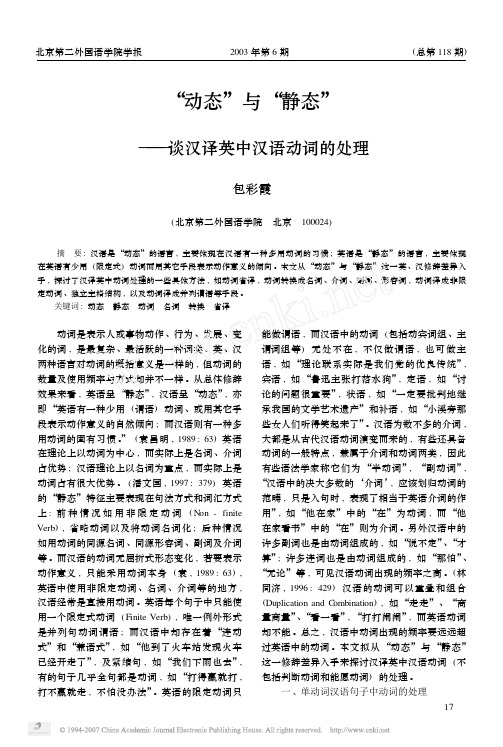
“动态”与“静态”———谈汉译英中汉语动词的处理包彩霞(北京第二外国语学院 北京 100024) 摘 要:汉语是“动态”的语言,主要体现在汉语有一种多用动词的习惯;英语是“静态”的语言,主要体现在英语有少用(限定式)动词而用其它手段表示动作意义的倾向。
本文从“动态”与“静态”这一英、汉修辞差异入手,探讨了汉译英中动词处理的一些具体方法,如动词省译,动词转换成名词、介词、副词、形容词,动词译成非限定动词、独立主格结构,以及动词译成并列谓语等手段。
关键词:动态 静态 动词 名词 转换 省译 动词是表示人或事物动作、行为、发展、变化的词,是最复杂、最活跃的一种词类。
英、汉两种语言对动词的概括意义是一样的,但动词的数量及使用频率与方式却并不一样。
从总体修辞效果来看,英语呈“静态”,汉语呈“动态”,亦即“英语有一种少用(谓语)动词、或用其它手段表示动作意义的自然倾向;而汉语则有一种多用动词的固有习惯。
”(袁昌明,1989:63)英语在理论上以动词为中心,而实际上是名词、介词占优势;汉语理论上以名词为重点,而实际上是动词占有很大优势。
(潘文国,1997:379)英语的“静态”特征主要表现在句法方式和词汇方式上:前种情况如用非限定动词(Non-finite Verb),省略动词以及将动词名词化;后种情况如用动词的同源名词、同源形容词、副词及介词等。
而汉语的动词无屈折式形态变化,若要表示动作意义,只能采用动词本身(袁,1989:63),英语中使用非限定动词、名词、介词等的地方,汉语经常是直接用动词。
英语每个句子中只能使用一个限定式动词(Finite Verb),唯一例外形式是并列句动词谓语;而汉语中却存在着“连动式”和“兼语式”,如“他到了火车站发现火车已经开走了”,及紧缩句,如“我们下雨也去”,有的句子几乎全句都是动词,如“打得赢就打,打不赢就走,不怕没办法”。
英语的限定动词只能做谓语,而汉语中的动词(包括动宾词组、主谓词组等)无处不在,不仅做谓语,也可做主语,如“理论联系实际是我们党的优良传统”,宾语,如“鲁迅主张打落水狗”,定语,如“讨论的问题很重要”,状语,如“一定要批判地继承我国的文学艺术遗产”和补语,如“小溪旁那些女人们听得笑起来了”。
第五章 英译汉的疑点

C: be+动词的同源形容词; exp1:All of us are quite familiar with the car. exp2:We believe that Europe should, and will be outward-looking. D:be+非动词同源形容词; His ill health has been a very anxious business. E: be+副词; That book will be out pretty soon.
F: be+介词短语; exp1:“My life is in your hands”,the man declared.
(注意一些介词的某些情况下的意思,加以理解就可以很容易的翻译的顺畅.)
G:be+过去分词; exp1:“I thought I was done with fatherhood because they are grown ,but I can’t stop being a father” Belly said, “it never ends” exp2:(句子三)
C:广义词具体化;
(大家一起看书上的几个例子P253)
D:其他情况具体化;(difficult relatively) Exp1:The star twinkled in transparent clarity. 星星在清澈的夜中闪烁。 Exp2:When he saw me ,he gave me a go-by. 他看见我是不理不睬. Exp3: His ego was of suitably gigantic[,dʒai'ɡæntik] proportion. 他心中的自很大,但无伤大雅
静态与动态翻译课件

2)Prepositional phrases used as connectives
e.g.
in case of 万一
for fear of 以免
in contrast with 与 …不同(bù tónɡ)
in search of 寻求
with regard to 关于
党的干部吃着粗茶淡饭,住着冰冷的窑洞,点着 昏暗的油灯,长时间地工作着。
On behalf of the organizing committee, I sincerely invite you to the conference on Western literature as an honored guest.
are beneath my notice. 对这样一个毫无教养的人口中之言,不值一理。
精品PPT
2. Prepositional phrases used as attributives
他是个脱离了低级趣味的人。 He is a man above vulgar interests. 他有人给他撑腰。 He has someone behind him. 我在读莎士比亚写的剧本。 I am reading a play by Shakespeare. 这个民有、民治(mín zhì)、民享的政府将永存于世。 The government of the people, by the people and
他邀请我去他家吃午饭(wǔfàn)。 He invited me to his house for lunch. 我们热烈欢迎你们参加这次研讨会。 We warmly welcome you to the seminar. 读书足以怡情,足以博彩,足以长才。 Studies serve for delight, for ornament and for ability.
- 1、下载文档前请自行甄别文档内容的完整性,平台不提供额外的编辑、内容补充、找答案等附加服务。
- 2、"仅部分预览"的文档,不可在线预览部分如存在完整性等问题,可反馈申请退款(可完整预览的文档不适用该条件!)。
- 3、如文档侵犯您的权益,请联系客服反馈,我们会尽快为您处理(人工客服工作时间:9:00-18:30)。
芳容。
Transformation from static English to dynamic Chinese
• 静态与动态之间的转换亦不乏灵活性,英 语抽象名词汉译过程中,我们偶尔也可以 将某些形式保留下来,而只要符合译入语 表述方式,在化静为动这一总体原则前提 下,翻译标准的相对性也允许译者拥有灵 活选择不同译文形式的权利。
the outer space. • 机器人已用于探索外层空间。 • 3)For a month the Governor had dilly-dallied over the
choice of a successor. • 选择由何人继任时,州长磨蹭了一个月 • 4)He had entertained hopes of being admitted to a sight
• Eg. He has been the ruler of that region for as long as twenty years.
• 他统治这一地区长达20年之久。
Reasons for static English and dynamic Chinese
• 3. 英语中的某些形容词、介词、副词等亦不乏静态意义 及功能,而且同上述两类名词一样,通过同义替代,这 些表达形式也可以借助动词转化为动态表述结构。如:
dynamic Chinese
• Translate the following sentences:
• 1)We aim at the assurance of a rounded and permanent national life.
• 我们的目标是保证国民生活圆满持久。 • 2)Robots have found application for the exploration of
Transformation from static English to dynamic Chinese
• 3)Our very anxiety is born out of our knowledge of what is now possible for each other and all.
• 静态: • That fellow is very talkative. 那家伙总是滔滔不绝。 • You have to wash the pill down with sips of water. 你得
喝几口水,把药丸咽下去。 • We must be off now. 我们要走了。 • 动态: • That fellow always talks too much. • You have to sip some water to wash the pill down. • We must go now.
• 想起母亲,他才鼓足勇气继续做了下去。
Reasons for static English and dynamic Chinese
2. 由动词派生或转化而来的施事名词。 所谓施事名词,即是施行或实施行为动作的名词,也
即表示动作行为主体的名词,这类名词大都由动词加-er, -or等后缀派生而来,有些也可能是动词的直接转化形式。 如: • The computer is a far more careful inspector than human beings. • 也可:The computer inspects far more carefully than human beings. • 计算机比人检查得更为仔细。
Reasons for static English and dynamic Chinese
• 总之,英语动词有形态变化,运用时要受 到诸多限制,因而有时会倾向于静态表达 手段,因此英语具有静态表达优势;汉语 动词无形态变化,形式上不受人称、时态 等约束,能方便地与主语或话题搭配成连 动式、兼语式等表达能力很强的谓语结构, 故此动词使用频率远高于英语,具有动态 表达优势。
• 译文一:老女校长的大话空话,校长的妹妹傻乎乎的好脾 气,年纪大的女孩子们的无聊闲扯、蜚短流长,女教师刻 板的不苟言笑,都同样令她讨厌。(×)
• 译文二:女校长这老太太总是空话连篇,自负十足,她那 傻乎乎的妹妹脾气好得一塌糊涂,年长一些的学生尽爱嚼 舌闲扯,蜚短流长,女教师又个个不苟言笑,古板正经, 这一切都同样让她烦不胜烦。
• 2)The pompous vanity of the old schoolmistress, the foolish good-humour of her sister, the silly chat and scandal of the elder girls, and the frigid correctness of the governesses equally annoyed her.
动态表达与静态表达 (Static vs. Dynamic)
• Compare the English sentences with the Chinese versions:
• 1. The doctor’s extremely quick arrival and uncommonly careful examination of the patient brought about his very speedy recovery.
• 医生迅速到达,并非常仔细地检查了病人,因此病人很快 就康复了。
• 2. The abuse of basic human rights in their own country in violation of the agreement reached at Helsinki earned them the condemnation of freedom-loving people everywhere.
Transformation from static English to dynamic Chinese
• 比较下列句子的译文,看看哪种译文更地道:
• 1)Marriage is a high-risk proposition. A man or a woman may appear to be good mate material, but the only proof of pudding is in the eating. And once you have taken a bite, it’s too late to change your mind.
英译汉的疑点
Teaching Objectives
• 1. Reasons for static English and dynamic Chinese;
• 2. Transformation methods from static English to dynamic Chinese
动态表达与静态表达 (Static vs. Dynamic)
• 儿子让我们大失所望 • 静态:Our son has been a disappointment to us. • 动态:Our son has been disappointing us.
• Eg. Only the thought of his mother gave him the strength to go on doing it.
• 他们违反在赫尔辛基达成的协议,在国内侵犯基本人权, 因此受到了各地热爱自由的人们的谴责。
Reasons for static English and dynamic Chinese
• 1.由动词或形容词派生而来的抽象名词,这些词语多具 有潜在或隐含的动态性,或者说系由相应的动态表述形 式转化而来。
• Broadly speaking, nouns can be characterized as “static” in that they refer to entities that are regarded as stable. At the opposite pole, verbs can be equally characterized as “dynamic”: they are fitted (by their capacity to show tense and aspect, for example) to indicate action, activity and temporary or changing conditions(Quirk 1973:48). Adjectives and prepositions often go hand in hand with nouns while adverbs are frequently used with verbs.
动态表达与静态表达 (Static vs. Dynamic)
• English is featured by its predominance of nouns over verbs.
• Our western civilization, it has been said, favours an over-development of the intellect at the expense of the emotions. That is why people prefer nouns to verbs. They suffer from what the Germans call ‘noun disease’. Instead of saying quite simply and straightforwardly London is growing rapidly, they say London’s growth is rapid. And they say John’s arrival was premature instead of John came too soon. (S. Potter,1960)
